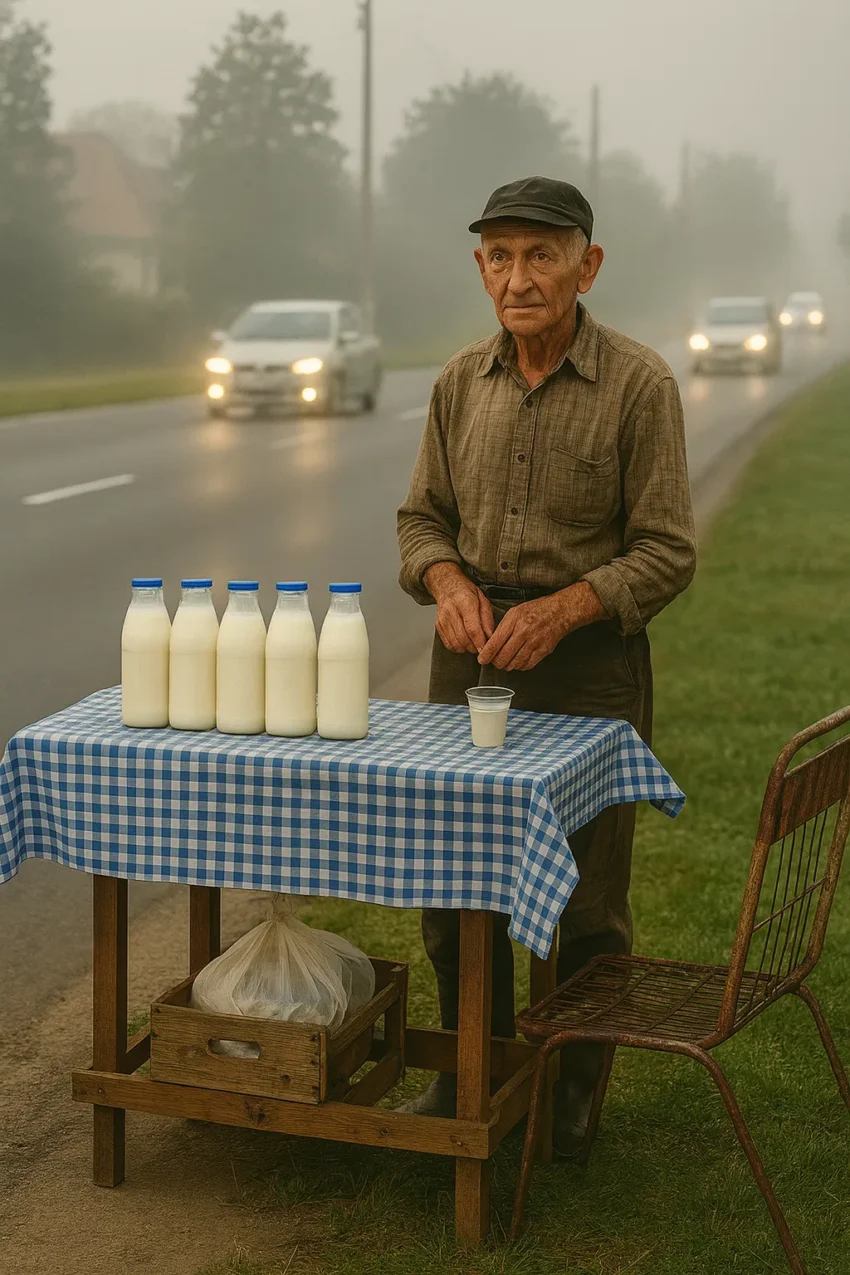It all started on a chaotic Tuesday morning.
I’d spilled coffee down the front of my white blouse, missed my regular freeway exit, and cursed under my breath as the reroute took me down a winding country road. I was already late to the office, and my boss, Brian, wasn’t exactly known for his patience. But as I sped past fields still heavy with morning mist, something caught my eye.
A small wooden table stood by the side of the road, barely steady on its legs. It was covered in a blue-checked cloth, faded and a little torn. Lined up on top were seven glass bottles of milk. Behind them stood a man—older, wiry, sun-weathered skin, dressed in a tan corduroy jacket that looked older than I was. He had no sign, no banner. Just the bottles and a paper cup.
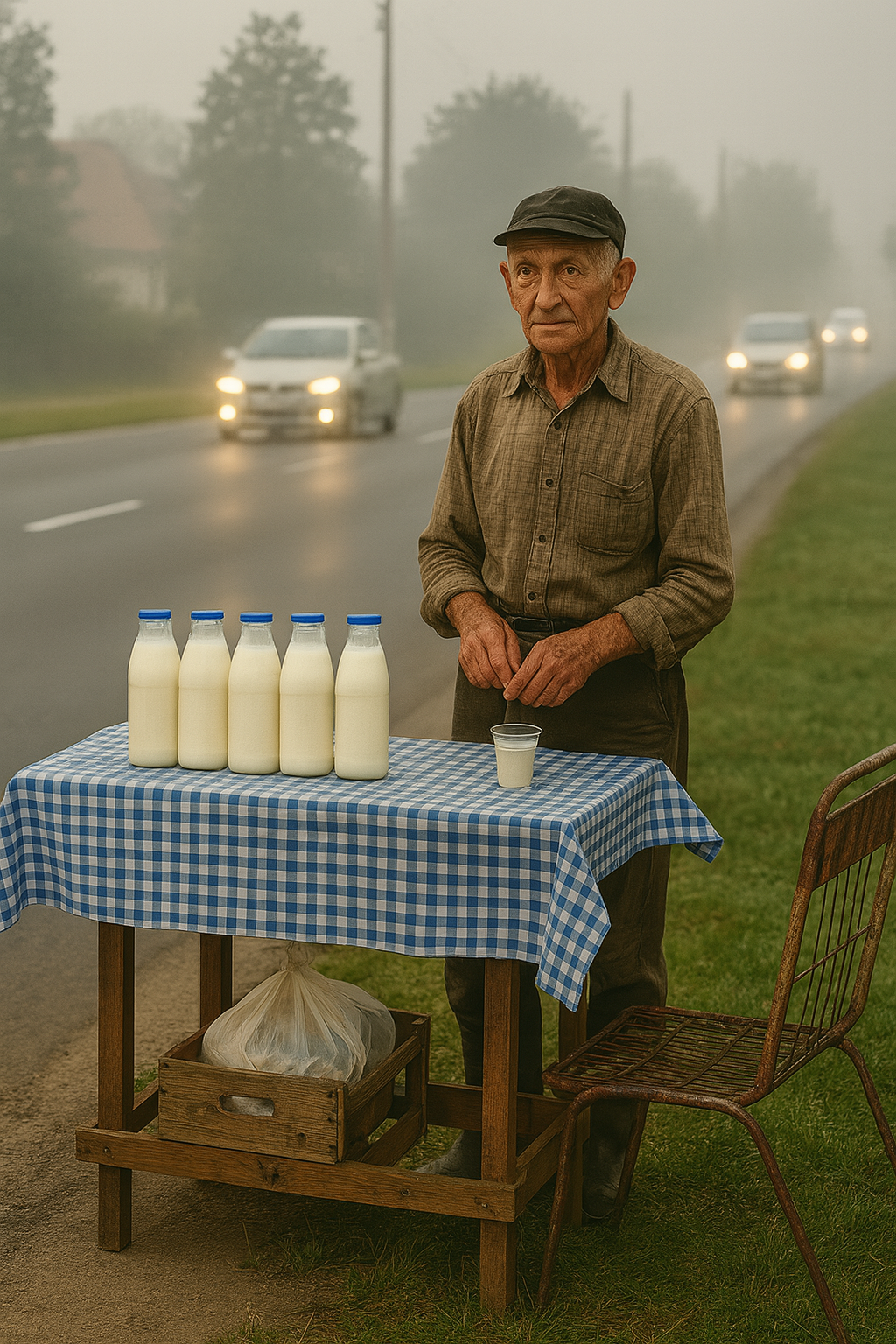
I don’t know what made me stop. Maybe the guilt of having yelled at the GPS moments earlier. Maybe curiosity. Maybe it was the way he stood—straight-backed, still, like he belonged to a time before rush hours and deadlines.
I rolled down my window. “How much for a bottle?”
The man didn’t smile. He didn’t even speak at first. He just nodded at the plastic cup beside the bottles. “Taste first,” he said, voice low and calm.
I took the paper cup, filled it from a bottle, and took a tentative sip. Cold. Creamy. Fresh. Not like store-bought milk. It tasted… real.
“How much?” I asked again, handing the cup back.
He finally looked at me, really looked, then said, “Pay what you think it’s worth.”
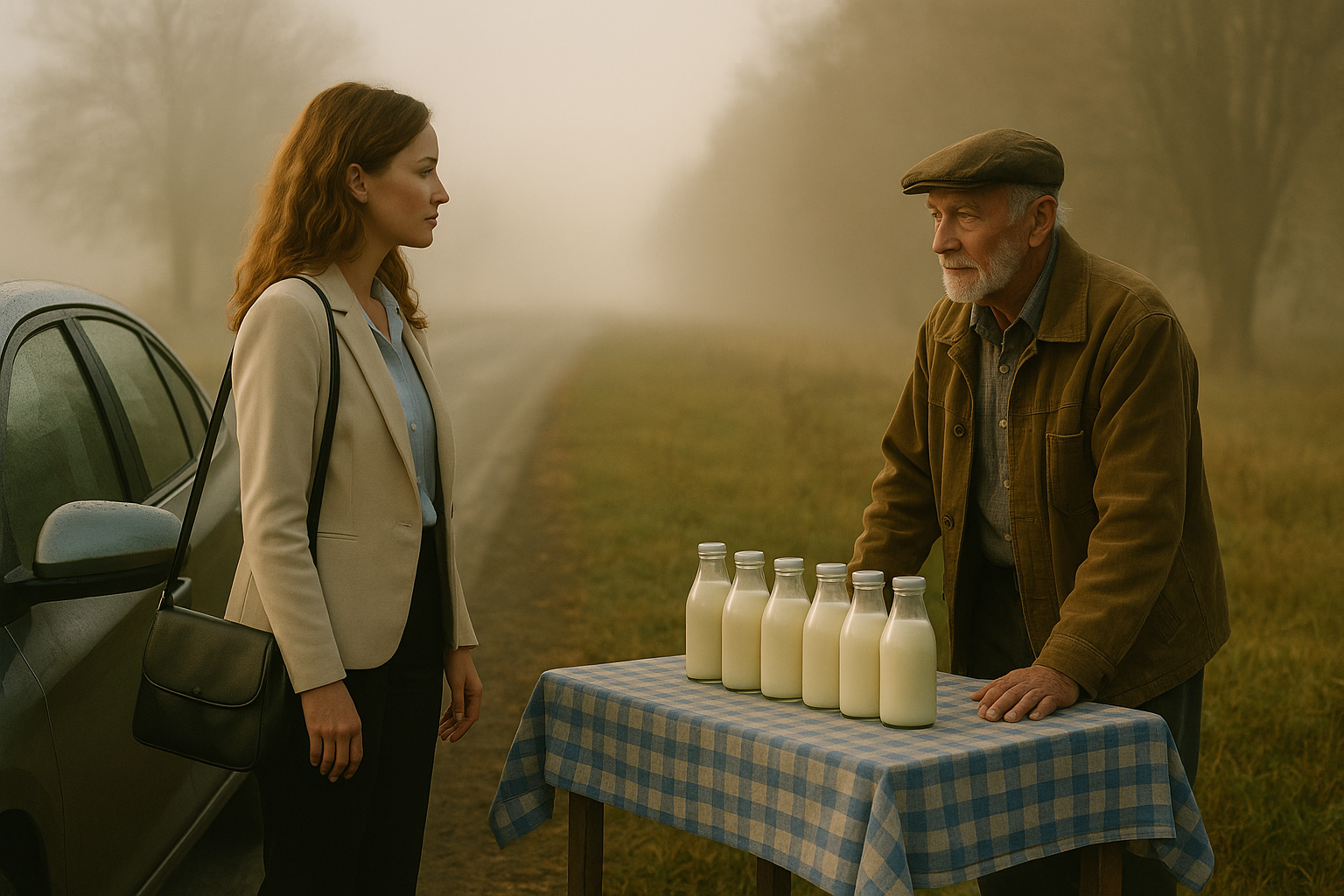
I fished out a five-dollar bill and handed it to him. He gave me a bottle, nodded once, and turned his gaze back to the road.
That was it.
But somehow, that bottle of milk made it home with me. I poured some into my coffee the next morning, and it changed the taste entirely. The kind of taste that lingers even after the mug is empty.
So the next day, I detoured again. And the next. Soon, it became a ritual—every weekday morning, I’d find him at the same spot, same table, same seven bottles lined up like soldiers. He never introduced himself, and I never asked. We exchanged a few quiet words. I’d sip from the cup, hand over some money, and drive off.
It became… peaceful. My quiet pocket of stillness before the madness of the day. I didn’t tell anyone. Not Brian, not my coworkers, not even my roommate Chloe. It felt too sacred, too strange, to explain.
But then came last Friday.
The morning was unusually warm for October, and I was wearing flats instead of my usual boots. When I pulled over, the man looked up but didn’t nod like usual. Something about his expression had shifted—tense, uncertain.
I got out of the car for the first time. “Thought I’d stretch my legs,” I said with a smile.
He didn’t answer. His eyes darted behind me and then back to his table. It was subtle, but I noticed. Something in his posture had changed. Like I’d trespassed into territory I wasn’t meant to.
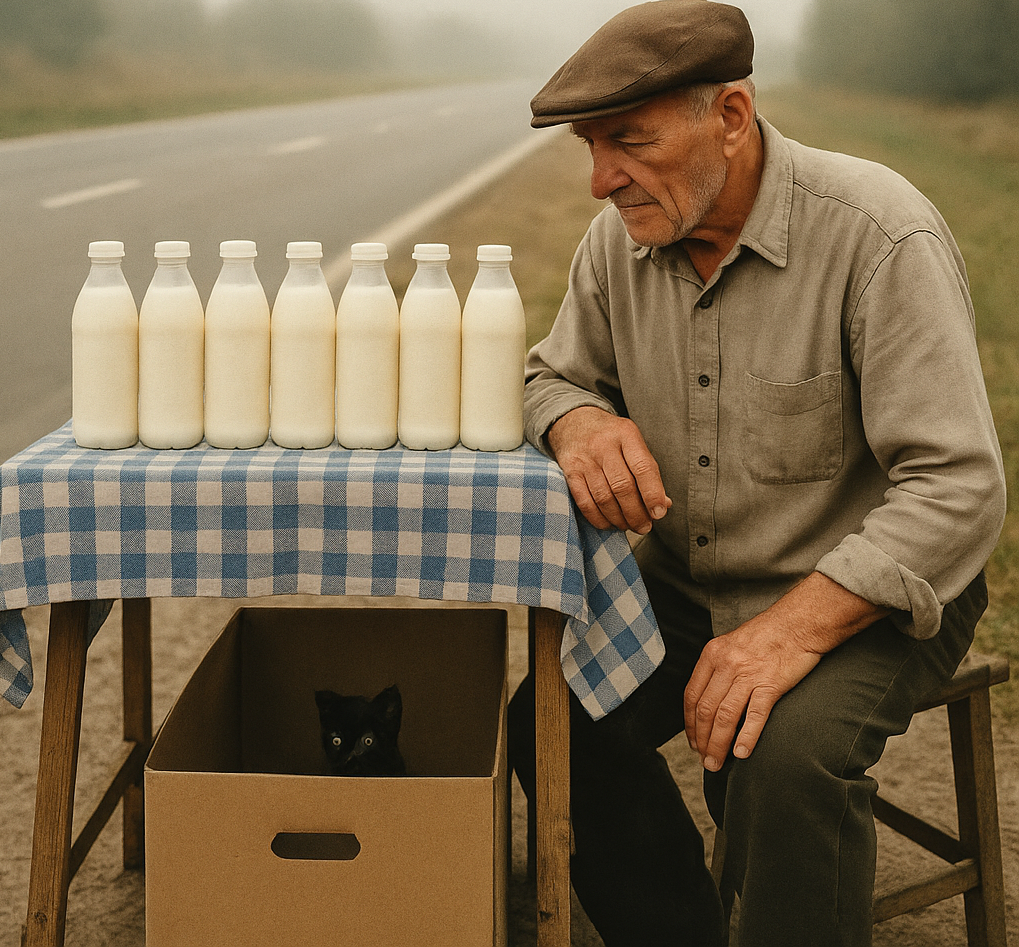
I bent down to tie my shoelace, mostly out of awkwardness—and that’s when I saw it.
A cardboard box, half-hidden beneath the blue cloth. The corner was chewed, and inside, something shifted. A flicker of movement. A paw?
“Is that a… puppy?” I asked, peering closer.
He stiffened. “It’s nothing.”
But I knelt fully, pulling back the edge of the cloth. Inside were two tiny creatures—bundled together, eyes still closed, shivering slightly.
“Wait—they’re newborns!” I exclaimed. “Where’s the mother?”
He hesitated. For a long moment, he just looked at me, as if weighing a thousand thoughts in his mind. Then he said quietly, “She was hit last week. She was a stray. Kept sneaking into my shed. I didn’t want to chase her off—figured she was hungry. Then one day, she didn’t come back.”
I swallowed hard. “And the puppies?”
“They were under the floorboards. I found them when I heard crying. I’ve been trying to feed them… but goat milk’s the best I have.”
My heart twisted.
I looked again at the bottles on the table. Seven bottles. He wasn’t selling it to make a profit. He was selling what little milk his goats produced—so he could keep feeding these puppies.
“How old are they?” I asked softly.
“Five days, maybe six.”
I looked back at him. “You can’t keep them in a box under the table.”
He shrugged. “Don’t have much choice.”
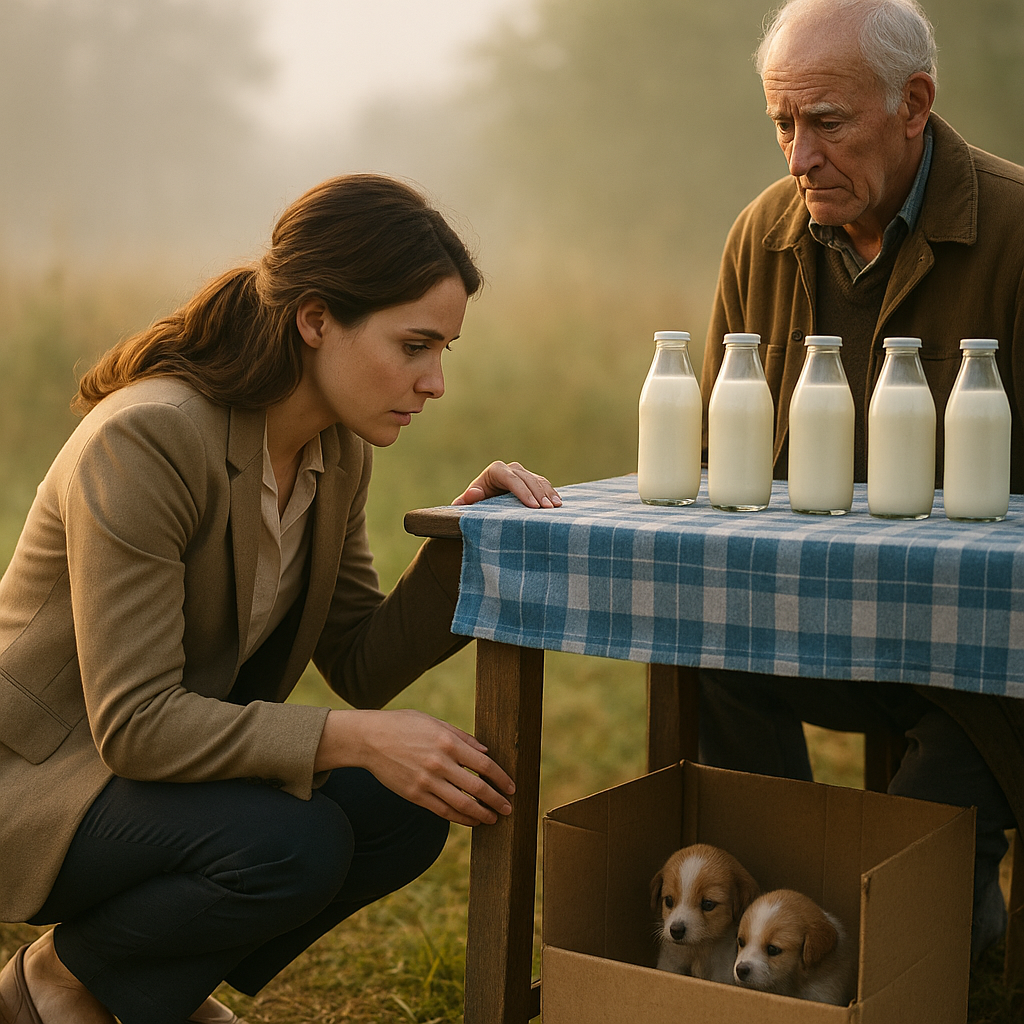
That night, I didn’t sleep.
I kept thinking about those puppies. Their tiny paws. The way they squirmed against each other for warmth. And the man—silent, proud, doing what he could with what little he had.
The next morning, Saturday, I drove back. No office, no boss waiting for me. Just me and a plan I hadn’t fully thought through.
He wasn’t at the usual spot. My heart jumped. But then I saw him further down the field, sitting on a crate, feeding one of the pups with a dropper.
He looked up, surprised. “You’re not working today.”
I sat beside him. “Neither are you.”
He chuckled—a small, dry sound. “Goats don’t take weekends off.”
I held out a small box of supplies—baby blankets, a feeding bottle, a can of puppy formula I’d picked up from a 24-hour pet store. “I thought maybe… they could use this.”
He stared at the box, then at me. His eyes, always steady, shimmered just slightly. “You didn’t have to do that.”
“I know,” I said. “But I wanted to.”
He looked down at the puppy in his hands. “I’ve been trying not to get attached.”
“Too late,” I said gently.
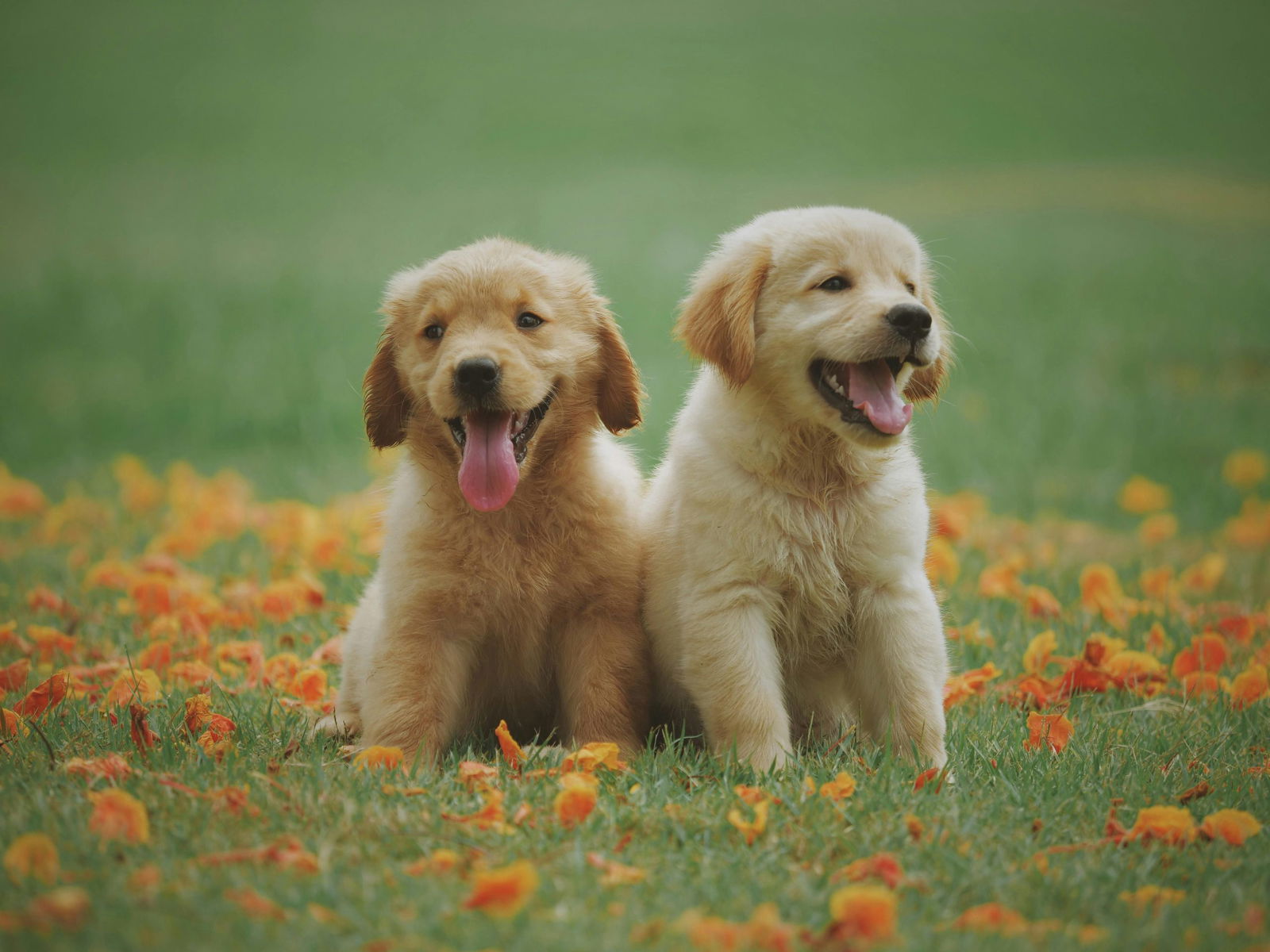
Over the next few weeks, I started visiting more often.
I’d bring snacks. Ask about the goats. Offer to help clean the bottles or hold a pup. He told me his name was Mr. Hollis. His goats had names like Mabel and Lulu and Clementine. His wife had passed years ago, and he lived in a little cabin not far off the highway.
“I never wanted to sell the milk,” he admitted one morning. “I just… figured if someone appreciated it, I’d have a reason to keep going.”
I smiled. “Well, now you have seven reasons.”
He raised an eyebrow.
“The five puppies,” I said, grinning, “and your two newest friends—me and Chloe.”
Chloe had insisted on coming with me one Saturday. She brought chew toys, cooed over the puppies, and asked Mr. Hollis a thousand questions. By the end of the visit, she was calling him “Grandpa H.”
The name stuck.
Winter crept in slowly. The puppies grew, their eyes opened, and their legs wobbled into tiny mischief machines. Mr. Hollis and I built them a proper enclosure next to the goat pen. He even let me paint a sign: “Mabel & Co. Dairy & Doggies.”
The table on the highway remained, but now it had more than just milk. We added jars of honey, goat cheese, and sometimes, if the weather was good, muffins baked by Chloe. Word spread, and locals started pulling over. Some just to talk to Mr. Hollis. Others to meet the puppies.
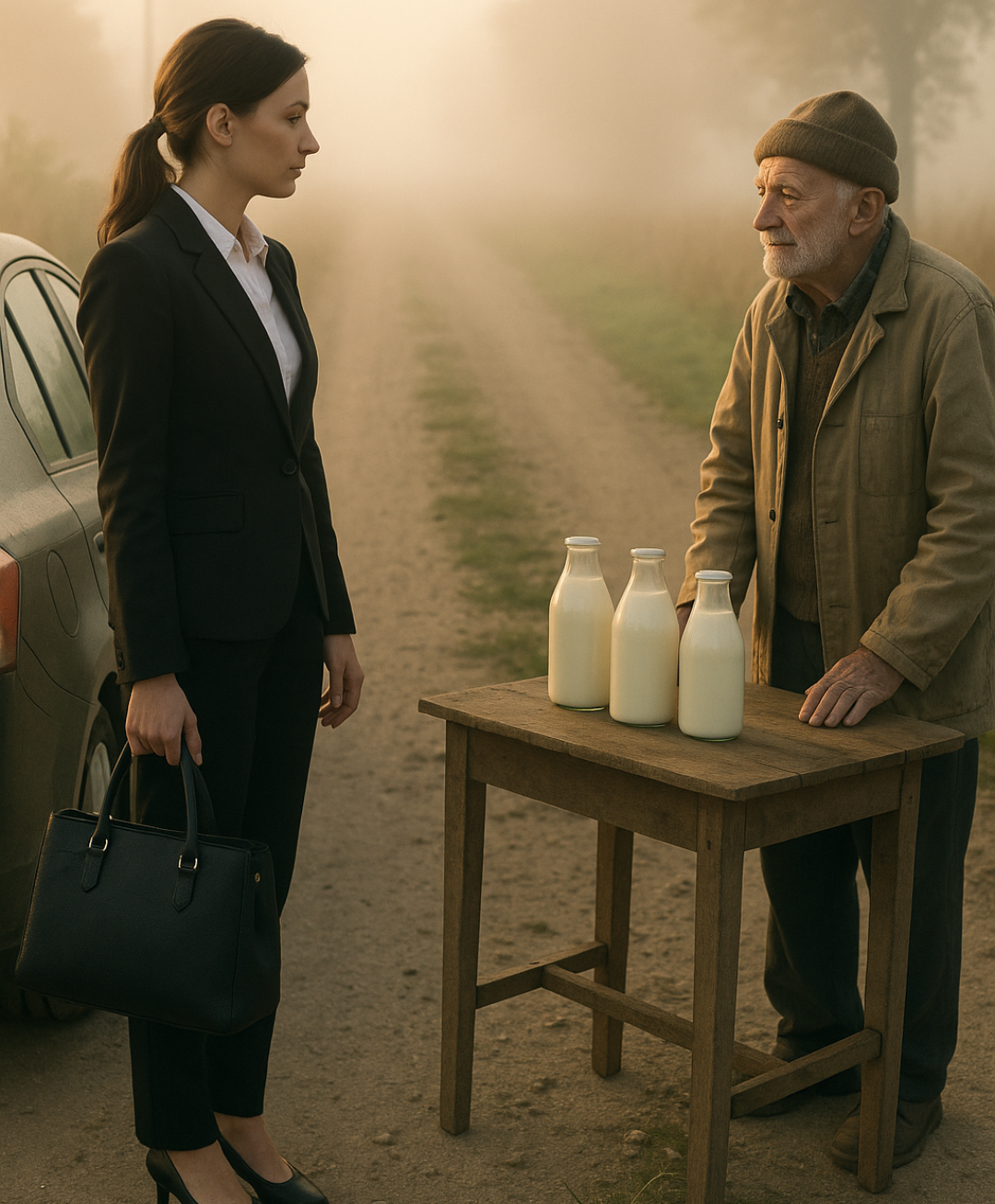
I still made my weekday detours. Still sipped from the paper cup, still handed over a bill. But it was never about the milk anymore.
It was about the quiet friendship. The way the world felt slower, kinder, under that blue-checked cloth.
One morning, months later, I came by to find a note taped to the table.
“Gone to town with Lily—puppy checkup! Back soon. Milk in cooler. Help yourself. —H.”
Lily, his favorite. The runt of the litter, but the one who always climbed into his lap first. I smiled and poured myself some milk.
As I leaned against my car, I looked at the horizon. Mist rolled over the field. Mabel the goat bleated somewhere in the distance.
And for a moment, in the stillness, I thought of how strange life is.
How a spilled coffee, a wrong turn, a wooden table, and a man who didn’t smile had somehow become the best part of my life.
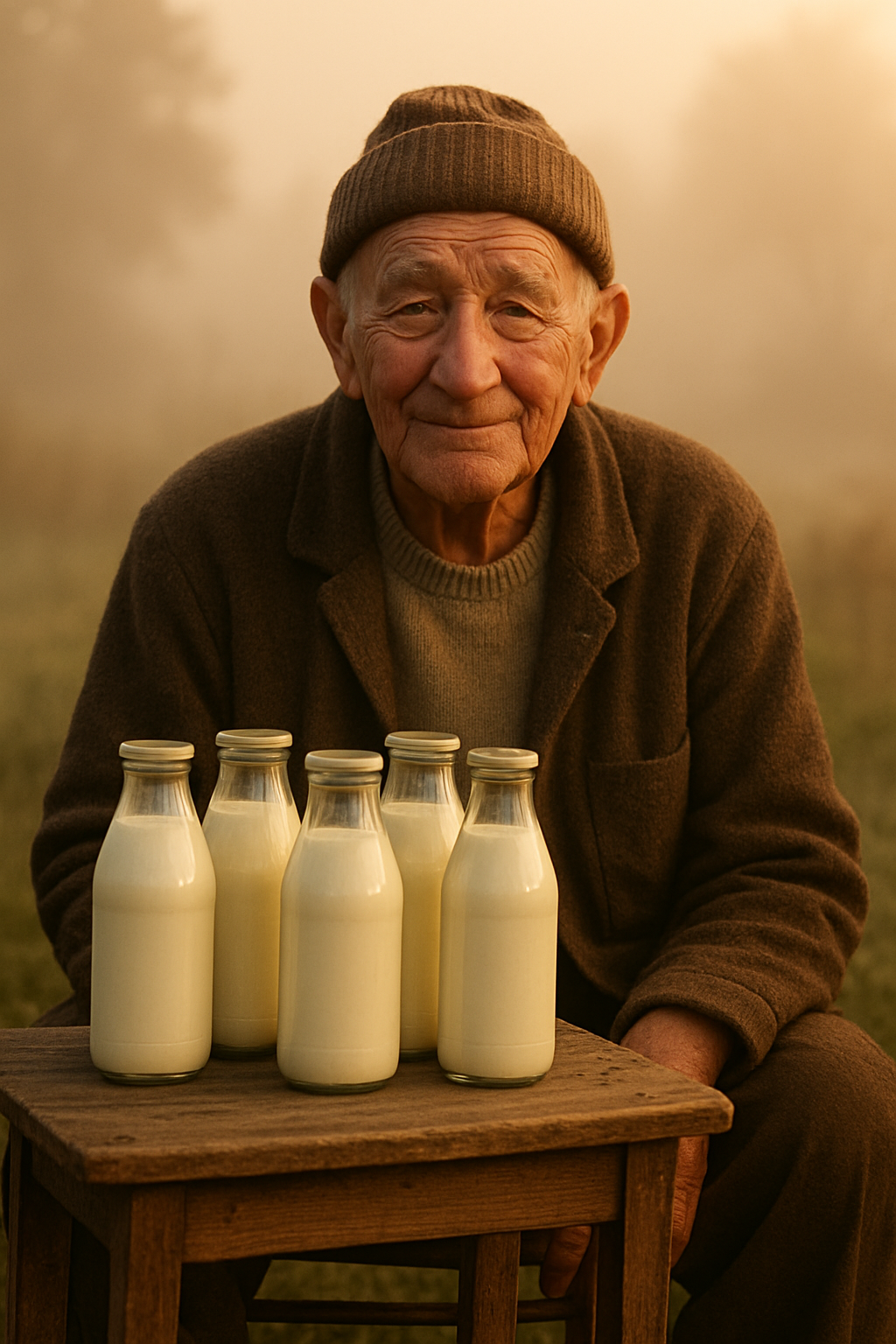
Two years later…
Mr. Hollis is still there, though we upgraded the table. The sign now says: “Mabel & Co. Dairy – Fresh Milk, Warm Pups, Good Company.”
Lily now lives with me and Chloe in the apartment. She’s a couch hog and refuses to eat anything but scrambled eggs on Sundays. Mr. Hollis comes over for dinner every week—he insists on bringing cheese, though we don’t let him cook.
And every morning, I still detour.
Not because I need the milk. But because some stories don’t start with grand plans or perfect timing.
Some stories start with a stranger, a bottle of milk… and a cardboard box hiding a little heartbeat.
And if you’re lucky enough to stop—your life might never be the same again.
